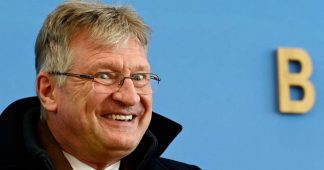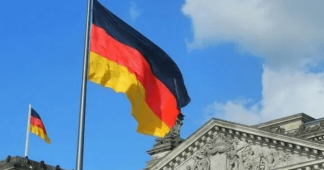Germany’s far-right AfD won its first district election Sunday, a further boost to the anti-immigration party as it surges to record highs in opinion polls.
Jun 25, 2023
Robert Sesselmann, a lawyer and regional lawmaker, came out on top in a closely watched runoff vote for district administrator in Sonneberg in the central state of Thuringia, near the border with Bavaria.
Sesselmann took 52.8 percent of the vote, according to the electoral office.
The victory came despite appeals from mainstream parties for voters to rally behind the incumbent candidate, Joergen Koepper from the conservative CDU.
With only around 57,000 people, Sonneberg is one of Germany‘s smaller districts, but the landmark victory makes it the first to be run by the Alternative for Germany (AfD) party.
“Robert Sesselmann has made history,” tweeted AfD co-chief Alice Weidel.
The milestone comes as recent surveys put support for the AfD at a record 18 to 20 percent, neck-and-neck with Chancellor Olaf Scholz‘s Social Democrats and behind only the conservative CDU/CSU bloc.
The AfD is polling even better in the former communist East German states of Thuringia, Brandenburg and Saxony, which will see regional elections next year where the AfD is hoping to score major breakthroughs.
Germany’s best-selling Bild newspaper called Sesselmann’s win a political “earthquake” and “a remarkable success for the ultra-right party”.
Thuringia’s interior minister Georg Maier, from the Social Democrats, called the outcome “an alarm bell for all democratic forces”, according to Bild.
The AfD’s regional party leader in Thuringia is the far-right firebrand Bjoern Hoecke, whose past statements on Germany’s Nazi past have caused outrage.
Hoecke, considered an extremist by German intelligence services, has called Berlin’s Holocaust monument a “memorial of shame” and urged a “180-degree shift” in the country’s culture of remembrance.
Created in 2013 as an anti-euro outfit before morphing into an anti-Islam, anti-immigration party, the AfD has benefited from growing discontent with Scholz’s three-party coalition amid concerns about inflation and the affordability of the government’s climate plans.
High immigration also remains a key voter concern.
The AfD stunned the political establishment when it took around 13 percent of votes in the 2017 general elections, catapulting its lawmakers into the German parliament.
It slid to around 10 percent in the 2021 federal election.
In Germany, where coalition governments are the norm, mainstream parties have always ruled out forming an alliance with the AfD.
(AFP)
We remind our readers that publication of articles on our site does not mean that we agree with what is written. Our policy is to publish anything which we consider of interest, so as to assist our readers in forming their opinions. Sometimes we even publish articles with which we totally disagree, since we believe it is important for our readers to be informed on as wide a spectrum of views as possible.











